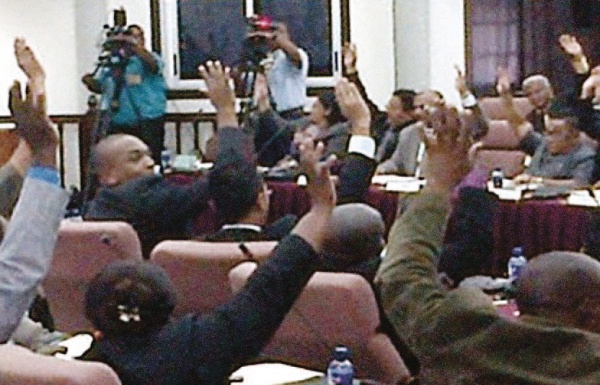Forging Partnerships for a Tobacco Free Suriname
Suriname undertook a collaborative effort involving the three branches of government and other relevant stakeholders to promote the enactment of legislation aligned with the Framework Convention on Tobacco Control (FCTC), which the country ratified in 2008. Following similar successful experiences in countries like Brazil and Uruguay, the health sector took the lead in planning and coordination, aware that it required the backing of other sectors to ensure success. The advocacy effort involved all social sectors and every district throughout the country. The National Assembly passed the anti-tobacco bill in February in a unanimous vote and it was signed into law by President Bouterse on March 6, 2013. The law includes reporting mechanisms, harsh penalties, and intersectoral collaboration for enforcement. The Ministry of Health pushed to include all levels of society in legislative oversight by educating the public on the new rules and their rights as an individual.
Meets the criteria established under Health in All Policies:
- Political commitment. The political will of key decision-makers was apparent throughout the process. President Desi Bouterse, a known smoker, publicly expressed his support for comprehensive anti-tobacco legislation with adequate enforcement mechanisms. Members of the National Assembly also consistently demonstrated support for this initiative.
- Separate structure. The Ministry of Health and the Pan American Health Organization initiated and guided this policy initiative. An intersectoral Tobacco Commission comprised of public and private sector representatives was created and approved by the National Assembly. The Tobacco Commission—the first of its kind in Suriname—and the National Assembly became the two formal platforms for this collaborative effort.
- Participation of other sectors. This advocacy effort involved a wide array of sectors and institutions, including: PAHO/WHO; the Ministries of Health, Trade and Industry, Justice, Labor, and the Environment; The National Assembly; Anton de Kom University (School of Law for consultation on the bill); sports associations; youth organizations; district commissioners and councils; transportation organizations (bus and taxi drivers); and the Chamber of Commerce.
- Separate budget. The country did not provide information on how the law will be funded. It is scheduled to enter into effect in June 2013.
- Focus on reducing inequity. The law is intended to protect vulnerable populations from the detrimental effects of secondhand smoke and protect the health of children, employees, and populations in the interior with limited access to information and services.
- Intersectoral action. Successful passage of the law required intersectoral action by all stakeholders. Intersectoral leadership will be required to promote, implement, and enforce the law.
- Public policy. The new law was enacted with strong support from all the relevant sectors.
- Evidence of results. As yet, there is no scientific evidence of the results of this effort. The Tobacco Commission will monitor and evaluate implementation and adherence to the law once it takes effect. The mechanisms established to regulate tobacco have yet to be evaluated since the law entered into force on June 7th, 2013.
- Social participation. This advocacy effort engaged multiple sectors of society, including government agencies, the private sector, nongovernmental organizations, civic groups, and the media. Other partners joined the effort spurred by growing momentum in favor of an anti-tobacco law in Suriname. In June 2012, the Ministry of Health organized a massive Anti-Smoking Walk that drew nearly 5,000 participants. This walk played a major role in generating press coverage and raising awareness about the pending legislation and in overcoming resistance from some areas of the public sector and the hospitality industry.
